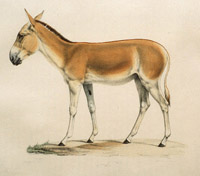
Erforschung biologischer Ressourcen der Mongolei / Exploration into the Biological Resources of Mongolia, ISSN 0440-1298
Date of this Version
2016
Document Type
Article
Citation
Erforschung biologischer Ressourcen der Mongolei (2016) band 13: 281-286.
Abstract
The breeding performance of nine breeding pairs of the Demoiselle crane Grus virgo has been investigated in Takhin Tal, Mongolia, in order to get information about their breeding density as well as the survival rate of the juveniles. To this end, the nests and the offspring have been monitored from hatching up to the age of about two months in order to get information about their survival rate. All pairs settled within a distance of about 2 km to the only river in the area, resulting in a density of about 0.6 couples per km. The number of surviving juveniles decreased to the level of 56 % until about the age of 50 days and mid-August, respectively. Afterwards, it remained stable. Provided there are no significant changes from one year to another the data indicate the time of the year after which offspring mortality becomes negligible. These observations allow estimating reliably the seasonal population size as well as the breeding success based on a few counts only.
Included in
Asian Studies Commons, Biodiversity Commons, Environmental Sciences Commons, Nature and Society Relations Commons, Other Animal Sciences Commons


Comments
Copyright 2016, Martin-Luther-Universität Halle Wittenberg, Halle (Saale). Used by permission.